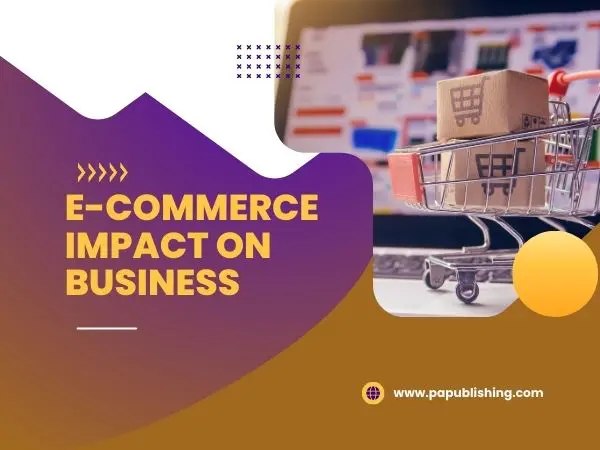E-commerce Impact on Business
With the emergence of Internet trading, products have undergone significant changes. The latest form of trading of goods is electronic commerce. It is popularly known as e-commerce, which has changed the fate of businesses forever. E-commerce has provided tools for businesses to dominate the market with fewer resources.
In this article, we will discuss the e-commerce impact on business and its potential downsides as well.
E-commerce Impact on Business – Positive Effects
E-commerce has affected businesses of every type: brick-and-mortar, service, or information business. You will be surprised to know that 28% of small businesses in the US don’t have a website despite the promising benefits of digital marketing.
According to Yaguara, 275 million US citizens shop online, which amounts to around 82% of the US’s total population. It’s a golden opportunity for businesses to jump over the e-commerce bandwagon and claim their spot in the billion-dollar industry.
Let’s first discuss the positive e-commerce impact on business;
Increased Revenue
The broader reach and advanced functionality of e-commerce platforms result in higher business profits. As a brick-and-mortar business, you are no longer limited to the geographical area you are located in. Anyone from around the world with internet access can purchase from your store, which positively impacts your overall revenue.
Low Operational Expense
Another e-commerce impact on business is low operational costs. You don’t need an extensive team to fulfill all duties related to running an e-commerce business. There is no need for a physical location as you can handle the team and even product fulfillment remotely (in the case of dropshipping and white-label business models).
Low Marketing Cost
Unlike traditional marketing, which costs a lot with an uncertain return on investment, digital marketing technology provides low-cost promotion and advertising opportunities. Unlike mass advertising methods, you can reach targeted audiences, yielding higher financial outcomes.
Wider Audience
You can reach a broad audience worldwide with the help of digital media platforms. There is no limit to who can visit your website and from which location. As long as you are present on search engines, floodgates of potential global traffic are at your disposal. However, you should know how to utilize online marketing strategies effectively.
Ease of Shopping
E-commerce platforms are jam-packed with features and functionality that make it easier for customers to complete the buying process. Accessibility and speed are the cornerstones of running an e-commerce business, resulting in a streamlined buyer’s journey.
Better Tracking and Measurement
E-commerce provides tracking and measurement options to a minute level, providing a wealth of data about users’ interactions with your site. Such a detailed level of analysis was impossible with offline marketing methods.
Optimized Customer Experience
You can go the extra mile to provide your customers with a great user experience, utilizing various techniques like user-friendly navigation, persuasive sales copy, instant customer support, and product demos.
E-commerce Impact on Business – Potential Downsides
E-commerce and small business are the best combination for an entrepreneurial-spirited person. Unlike service businesses, e-commerce holds way more potential in financial outcomes. However, it has its own set of challenges. Let’s have a look at them:
Changing Customer and Market Trends
The online market is constantly changing with changing user behaviors. As a business owner, it may be alarming if you do not adapt to the shifting trends. Keeping your fingers on the pulse will buffer you from market volatility. You will be better informed to adjust your strategy according to changing customer habits.
Dependency on Smartphones
More than 50% of internet users rely on smartphones to purchase online. This calls for mobile-responsive websites so that usability issues can be avoided altogether.
Data Privacy and Security
E-commerce websites need to take customers’ personal information like name, address, and bank details to process payments. This requires significant care on the retailer’s part to protect customers’ information from being stealth away by internet fraudsters and hackers.
Some of the e-commerce impacts on business examples that are notable and disruptive are Amazon, Walmart, and Olx. These e-commerce marketplaces changed the trade landscape, forcing traditional retailers to rethink their business models.
Conclusion
We learned about the e-commerce impact on business, covering its benefits and some potential downsides. The world of e-commerce is quite lucrative, but it should be approached proactively and responsibly. E-commerce and business have become indispensable in today’s economy, and it’s the right time for businesses to leverage this opportunity for maximum growth.






